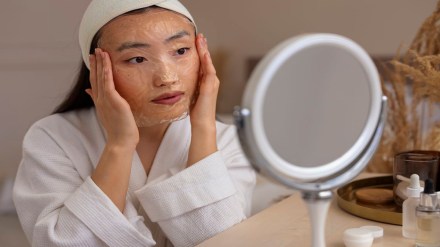By Poulomi Roy
The skincare industry is undergoing a remarkable transformation, driven by the integration of cutting-edge technology, evolving consumer preferences, and bold marketing innovations. Traditionally, the beauty and personal care (BPC) sector relied heavily on traditional retail channels, glossy advertisements, and one-size-fits-all messaging to connect with consumers. However, in the recent years we have seen a paradigm shift, with boutique and legacy brands alike embracing a more personalised, technology-driven approach to cater to increasingly discerning consumers.
The COVID-19 pandemic served as a catalyst for this transformation, compelling brands to adapt swiftly to a digital-first landscape. The era also saw a surge in consumer awareness about holistic skincare, emphasising health, wellness, and sustainability. The industry’s response to these changes has not only redefined how products are marketed but also how they are created and experienced. As we move into the future, this sector is poised for further reinvention, where innovation will be the cornerstone of growth.
Here are five key trends and innovations shaping the future of skincare:
Personalised skincare powered by AI and data analytics: Artificial Intelligence (AI) is transforming every industry, and the Beauty and Personal Care (BPC) sector is no exception. The rise of advanced technology is transforming skincare, making it easier than ever for consumers to find products tailored to their unique needs. Artificial Intelligence (AI) is leading this change, revolutionising the Beauty and Personal Care (BPC) industry by delivering deeply personalised experiences. AI can analyse vast amounts of information—such as your skin type, environmental factors, and lifestyle habits—to help brands create skincare solutions designed specifically for you. Gone are the days of one-size-fits-all products. Today, AI-powered tools can assess your skin’s needs and recommend a customised routine that addresses your concerns. This personalised approach doesn’t just enhance the effectiveness of your skincare routine; it fosters a deeper connection between brands and consumers, allowing for more relevant and meaningful interactions. By leveraging AI and data analytics, skincare brands are not just selling products; they’re offering individualised care that speaks directly to your skin’s needs.
Natural and sustainable skincare: Sustainability has become a necessity in today’s skincare market. Indian consumers, like you and me, are becoming more conscious about the environmental impact of the products we use. This shift in mindset is driving brands to adopt eco-friendly practices, focusing on reducing plastic waste, using recyclable materials, and offering more sustainable packaging options. At Joy Personal Care we are committed to reducing our environmental footprint by focusing on recycling and minimising plastic usage. With a goal of recycling more plastic than consumed over the next five to seven years, we are also innovating with sustainable packaging solutions. While recycled packaging may still face some hesitancy from consumers, secondary packaging that’s eco-friendly, chemical-free, and cruelty-free is gaining traction. It’s not just about the packaging, though. As more people demand cruelty-free, natural, and sustainable skincare options, we at Joy Personal Care are stepping up to lead the charge. What excites me most about these changes is how digital transformation, shifting consumer preferences, and global trends are converging to create incredible opportunities for both consumers and businesses. The future of the Indian beauty industry is brighter than ever, promising innovation, inclusivity, and sustainability at its core.
Experiential marketing: Experiential marketing is transforming the consumer experience, with technologies like AR, VR, and anamorphic displays leading the way. AR enables virtual try-ons, helping consumers preview skincare products before purchasing and boosting confidence in their decisions. VR takes this further with fully immersive, interactive experiences that deepen engagement.
Anamorphic displays are another innovative element, creating 3D visuals that appear to have depth and dimension when viewed from a specific angle. These captivating projections provide a dynamic, attention-grabbing experience.
Joy Personal Care embraced this innovation through its anamorphic display for the JOY KKR 4D Fan-tasy campaign at South City Mall, Kolkata. This campaign, marking their third partnership with Kolkata Knight Riders (KKR), was unveiled by actress Mimi Chakraborty. The campaign created an engaging, stadium-like atmosphere with interactive contests, offering a unique and memorable connection with the audience.
Celebrity, macro and nano-influencer marketing: Influencers—whether celebrity, macro, or nano—are playing a crucial role in shaping skincare marketing today. Celebrities bring broad recognition, while macro-influencers engage large audiences, and nano-influencers connect with smaller, highly loyal communities. Their authentic and relatable endorsements create a stronger bond with consumers. In line with this trend, Joy Personal Care’s recent winter campaign effectively blended the star power of celebrities like Sanya Malhotra, Medha Shankr, and Mimi Chakraborty with the credibility and authenticity of macro and nano-influencers, extending the brand’s reach and fostering deeper connections with diverse consumer segments.
Social commerce and shoppable content: Social media platforms are rapidly becoming major e-commerce hubs, allowing you to shop directly from your feeds. Features like shoppable posts, live streaming, and integrated purchase options create a seamless shopping experience without ever having to leave your favorite social apps. For skincare brands, this shift opens up new opportunities to engage with you in real time, showcase products through influencer collaborations, and drive instant sales. At Joy Personal Care, we have adapted our marketing strategy to appeal to younger audiences by focusing on platforms like Instagram, YouTube, and OTT channels. “To engage with Gen Z, we’ve significantly increased our digital spend,” a brand representative shares. This strategy aligns with the growth of social commerce, offering a more direct and engaging way for you to discover and purchase products instantly.
As the skincare industry continues to innovate, these trends and innovations will shape the way you experience and shop for skincare. Stay tuned, as the future of skincare is looking more personalised, sustainable, and interactive than ever.
The author is chief marketing officer, Joy Personal Care (RSH Global). Views expressed are personal and not necessarily those of financialexpress.com.
